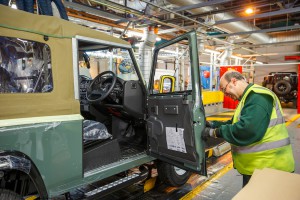Many tout the rise of the electric vehicle as a way to create new opportunities and new jobs, but one would be hard pressed to convince the 1,000 employees that Jaguar Land Rover plans to lay off due to the decline of diesel.
JLR, which is owned by parent company Tata Motors, is not only cutting jobs, but is also reducing production at two of its English factories as demand for diesel cars slumps due to higher taxes and regulatory changes related to Britain’s exit from the European Union.
British new car registrations have been falling during the past year which the industry has blamed, in part, on weakening consumer confidence in the wake of the Brexit vote, after record demand in 2015 and 2016.
However, the recent bad publicity surrounding diesels due to Volkswagen and other makers is also clearly hitting JLR’s bottom line. The company will lay off some of its agency workers at its central English Solihull site and move just more than 350 people to the location from its nearby Castle Bromwich plant.
(Plugging in: Jaguar debuts I-Pace e-SUV. Click Here for the story.)
Jaguar sales are down 26% so far this year while Land Rover demand dropped 20% in its home market as buyers shun diesel.About 90% of Jaguar Land Rover’s sales in Britain are diesel models, which compares with around 45% globally.
Overall, February’s new car registrations show new diesels account for just 35% of sales, but six years ago, this figure was more than 50%. The case against diesel engines in the UK, despite their popularity has been mounting for some time. A recent study by the Royal College of Physicians in the United Kingdome tied poor air quality, in part from diesels, to 40,000 premature deaths a year, and a £20billion annual cost to the economy.
In Britain, the sales decline is unlikely to change anytime soon as London continues to expand its restrictions on vehicles in the city, especially diesels. Additionally, cities in France, Germany, China and other places are preparing to implement similar diesel bans.
The move has prompted many automakers, especially Volkswagen, to make significant shifts in their production models. VW is in the midst of implementing its Strategy 2025 plan, which centers on rolling out more than two dozen battery-electric models by 2025.
(Click Here for more about Land Rover bringing back the two-door with the SV Coupe.)
Rather than stick its head in the sand, JLR has been moving to offer more electric models albeit at a much slower pace. The company just rolled out the Jaguar I-Pace all-electric SUV.
“We set out with a clean sheet approach to harness new battery electric technology with an architecture engineered from the outset to optimize EV performance, aerodynamics and interior space. The result is the I-Pace – a true Jaguar and a truly driver-focused EV,” said Ian Hoban, Jaguar’s Vehicle Line Director.
The move to a battery-based SUV makes sense given the shift in preferences in the global automotive market toward utilities. Utility vehicles of all sorts accounting for more than half of the U.S. market in recent months, as well as a growing share in other key markets, such as China and Europe.
While Jaguar seems to be moving to adapt to the electrification movement, it could more difficult for Land Rover half of JLR. A pure EV may be coming down the road, but for now, the company is offering its 2019 Range Rover P400e plug-in hybrid.
(To see more about the possibility of Jaguar Land Rover adding a brand, Click Here.)
Land Rover’s PHEV powertrain is composed of a 296 horsepower version of JLR’s 2.0-liter turbo-four gas engine and a 114-hp electric motor fed by a 13.1-kW-hr lithium-ion battery. The overall output is 398 hp and 472 lb-ft of torque.


